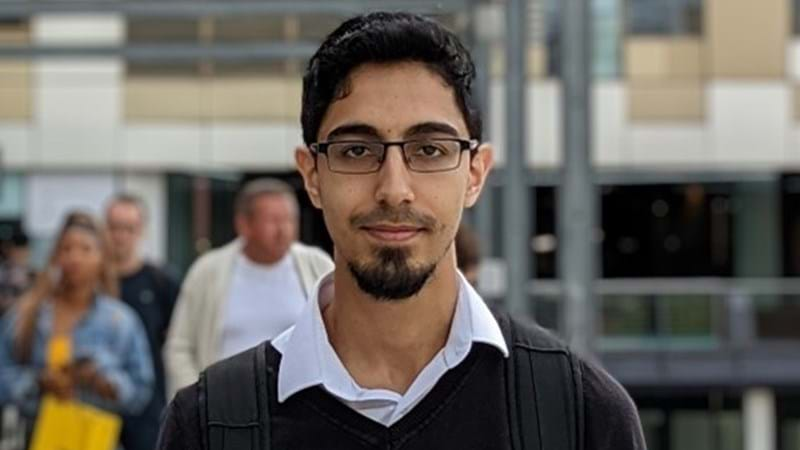Year in Industry interview with Haarith Rehman
Published
12 Dec 2022
In 2022, we launched our first ever ‘Year In Industry’ programme for students to spend a year within the organisation, learning about National Highways and having a direct impact on the work we do.

Share this article
We caught up with Haarith Rehman to find out more about him, why he chose to do our ‘Year in Industry’ and what he has learnt along the way.
Tell us a bit about yourself and why you decided you wanted to do a year in industry with us.
My name is Haarith and I study chemical engineering at the University of Aston. Often people think my degree is about chemistry, but really 80% is maths and physics.
I decided I wanted to undertake a year in industry particularly with National Highways because I wanted to understand more about the way in which motorways are maintained and operated. We all use the motorway network, but we never really think about how it works. I thought this would be a fantastic chance for me to learn more about what actually goes on.
I also really liked that the role was open to anyone. It wasn’t just for people studying traffic management or civil engineering but really it was for anyone who had an interest in technology.
What does your current role look like?
I have been based in the Concrete Roads, Centre of Excellence team.
Our team mainly focuses on research and innovation and finding new and unique technologies that we can use on the Strategic Road Network.
National Highways looks after about 400 miles of concrete and some of these stretches are now coming towards the end of their life. So, we need to ensure they are up to date by either repairing or replacing them.
What do you enjoy most about working in the Concrete Roads team?
I love that it is a very interdisciplinary team mainly because there is always so much to think about when it comes to motorways. It’s fast pace and a great place to learn and really harness your knowledge. I also enjoy knowing that what I’m working on has a much bigger impact on the UK.
One of the things that I've really enjoyed doing is working on a ‘Sound Cam’ project. We have been working with Cambridge University to study the sound emitted from concrete roads whilst cars are driving over them. The camera essentially visualises sound so you can see the sound bouncing off tyres and onto the surface of the road.
This technology can use certain frequencies of sound and at certain wavelengths to see whether there's a defect on the road. So in the future, you could have the ‘sound camera’ attached to a vehicle to measure and monitor the defects without having to send loads of people to the site and disrupt roads.
So, it sounds like you are really interested in the research, technology and innovation side of the job?
Yes, I think that’s it! Technology is always evolving and it’s really interesting to be able to bridge the gap between lab scale to industrial scale. It is so important to get out onto the network and think of new ways to improve it.
What do you think the most challenging thing that's been a part of the year in industry for you?
Honestly, I think I would have to say the change in routine from university. As a student you get very used to working late at night and getting up later or just in time for lectures. But it has been equally rewarding in terms of learning how to manage myself, manage my time - especially knowing that sometimes you have to be reactive to changes in your day. Some days I’m needed on site, the next day we are on a school visit or at an event.
Have you enjoyed taking part in the school visits?
Yes, definitely and it’s really helped my communication skills especially as I am talking with people outside of National Highways.
By preparing these visits and helping decide what we are going to talk about with the school students has helped show me how much I have learnt in the six months I have been here. It’s a good chance to see how much knowledge you have acquired.
Why do you think STEM education is so vital to the world we live in right now?
I think STEM is really the building block of research and innovation. School visits and internship programmes seem a great way for companies to show what kind of jobs are out there. Quite often, being able to see people doing their job gives you a better connection to what the real world can offer.
What do you hope to do in the future?
I definitely want to keep progressing in engineering. I have enjoyed the acoustic engineering and the work around new technologies and product design. As long as I am passionate and interested in the work that I am doing, that is what I am excited for in the future.
And our last question, what advice would you give to the person next year coming into our ‘Year in Industry’ programme? What would you say to them?
Make a good connection with you line manager because they will help you with anything, big or small. Take the time to ask questions, don’t overwhelm yourself – learn and observe. The change in routine from university is a big adjustment but it is so rewarding!
